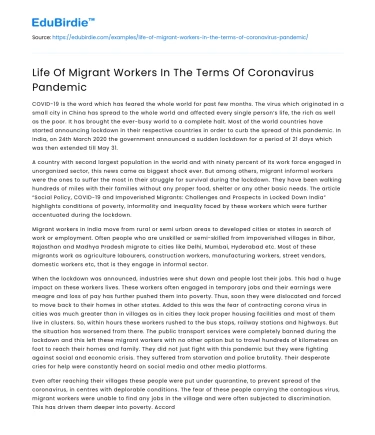COVID-19 is the word which has feared the whole world for past few months. The virus which originated in a small city in China has spread to the whole world and affected every single person’s life, the rich as well as the poor. It has brought the ever-busy world to a complete halt. Most of the world countries have started announcing lockdown in their respective countries in order to curb the spread of this pandemic. In India, on 24th March 2020 the government announced a sudden lockdown for a period of 21 days which was then extended till May 31.
A country with second largest population in the world and with ninety percent of its work force engaged in unorganized sector, this news came as biggest shock ever. But among others, migrant informal workers were the ones to suffer the most in their struggle for survival during the lockdown. They have been walking hundreds of miles with their families without any proper food, shelter or any other basic needs. The article “Social Policy, COVID-19 and Impoverished Migrants: Challenges and Prospects in Locked Down India” highlights conditions of poverty, informality and inequality faced by these workers which were further accentuated during the lockdown.
Save your time!
We can take care of your essay
- Proper editing and formatting
- Free revision, title page, and bibliography
- Flexible prices and money-back guarantee
Migrant workers in India move from rural or semi urban areas to developed cities or states in search of work or employment. Often people who are unskilled or semi-skilled from impoverished villages in Bihar, Rajasthan and Madhya Pradesh migrate to cities like Delhi, Mumbai, Hyderabad etc. Most of these migrants work as agriculture labourers, construction workers, manufacturing workers, street vendors, domestic workers etc, that is they engage in informal sector.
When the lockdown was announced, industries were shut down and people lost their jobs. This had a huge impact on these workers lives. These workers often engaged in temporary jobs and their earnings were meagre and loss of pay has further pushed them into poverty. Thus, soon they were dislocated and forced to move back to their homes in other states. Added to this was the fear of contracting corona virus in cities was much greater than in villages as in cities they lack proper housing facilities and most of them live in clusters. So, within hours these workers rushed to the bus stops, railway stations and highways. But the situation has worsened from there. The public transport services were completely banned during the lockdown and this left these migrant workers with no other option but to travel hundreds of kilometres on foot to reach their homes and family. They did not just fight with this pandemic but they were fighting against social and economic crisis. They suffered from starvation and police brutality. Their desperate cries for help were constantly heard on social media and other media platforms.
Even after reaching their villages these people were put under quarantine, to prevent spread of the coronavirus, in centres with deplorable conditions. The fear of these people carrying the contagious virus, migrant workers were unable to find any jobs in the village and were often subjected to discrimination. This has driven them deeper into poverty. According to the recently released report by International Labour Organization (ILO), 400 million workers are at a risk of falling deeper into poverty during the lockdown.






 Stuck on your essay?
Stuck on your essay?

